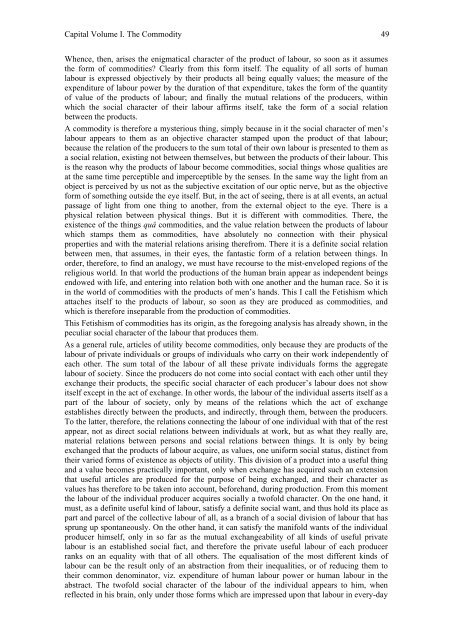The Communist Manifesto
The Communist Manifesto
The Communist Manifesto
You also want an ePaper? Increase the reach of your titles
YUMPU automatically turns print PDFs into web optimized ePapers that Google loves.
Capital Volume I. <strong>The</strong> Commodity 49Whence, then, arises the enigmatical character of the product of labour, so soon as it assumesthe form of commodities? Clearly from this form itself. <strong>The</strong> equality of all sorts of humanlabour is expressed objectively by their products all being equally values; the measure of theexpenditure of labour power by the duration of that expenditure, takes the form of the quantityof value of the products of labour; and finally the mutual relations of the producers, withinwhich the social character of their labour affirms itself, take the form of a social relationbetween the products.A commodity is therefore a mysterious thing, simply because in it the social character of men’slabour appears to them as an objective character stamped upon the product of that labour;because the relation of the producers to the sum total of their own labour is presented to them asa social relation, existing not between themselves, but between the products of their labour. Thisis the reason why the products of labour become commodities, social things whose qualities areat the same time perceptible and imperceptible by the senses. In the same way the light from anobject is perceived by us not as the subjective excitation of our optic nerve, but as the objectiveform of something outside the eye itself. But, in the act of seeing, there is at all events, an actualpassage of light from one thing to another, from the external object to the eye. <strong>The</strong>re is aphysical relation between physical things. But it is different with commodities. <strong>The</strong>re, theexistence of the things quâ commodities, and the value relation between the products of labourwhich stamps them as commodities, have absolutely no connection with their physicalproperties and with the material relations arising therefrom. <strong>The</strong>re it is a definite social relationbetween men, that assumes, in their eyes, the fantastic form of a relation between things. Inorder, therefore, to find an analogy, we must have recourse to the mist-enveloped regions of thereligious world. In that world the productions of the human brain appear as independent beingsendowed with life, and entering into relation both with one another and the human race. So it isin the world of commodities with the products of men’s hands. This I call the Fetishism whichattaches itself to the products of labour, so soon as they are produced as commodities, andwhich is therefore inseparable from the production of commodities.This Fetishism of commodities has its origin, as the foregoing analysis has already shown, in thepeculiar social character of the labour that produces them.As a general rule, articles of utility become commodities, only because they are products of thelabour of private individuals or groups of individuals who carry on their work independently ofeach other. <strong>The</strong> sum total of the labour of all these private individuals forms the aggregatelabour of society. Since the producers do not come into social contact with each other until theyexchange their products, the specific social character of each producer’s labour does not showitself except in the act of exchange. In other words, the labour of the individual asserts itself as apart of the labour of society, only by means of the relations which the act of exchangeestablishes directly between the products, and indirectly, through them, between the producers.To the latter, therefore, the relations connecting the labour of one individual with that of the restappear, not as direct social relations between individuals at work, but as what they really are,material relations between persons and social relations between things. It is only by beingexchanged that the products of labour acquire, as values, one uniform social status, distinct fromtheir varied forms of existence as objects of utility. This division of a product into a useful thingand a value becomes practically important, only when exchange has acquired such an extensionthat useful articles are produced for the purpose of being exchanged, and their character asvalues has therefore to be taken into account, beforehand, during production. From this momentthe labour of the individual producer acquires socially a twofold character. On the one hand, itmust, as a definite useful kind of labour, satisfy a definite social want, and thus hold its place aspart and parcel of the collective labour of all, as a branch of a social division of labour that hassprung up spontaneously. On the other hand, it can satisfy the manifold wants of the individualproducer himself, only in so far as the mutual exchangeability of all kinds of useful privatelabour is an established social fact, and therefore the private useful labour of each producerranks on an equality with that of all others. <strong>The</strong> equalisation of the most different kinds oflabour can be the result only of an abstraction from their inequalities, or of reducing them totheir common denominator, viz. expenditure of human labour power or human labour in theabstract. <strong>The</strong> twofold social character of the labour of the individual appears to him, whenreflected in his brain, only under those forms which are impressed upon that labour in every-day














![tyf Enf=O=n]lgg](https://img.yumpu.com/47584932/1/190x245/tyf-enfonlgg.jpg?quality=85)

